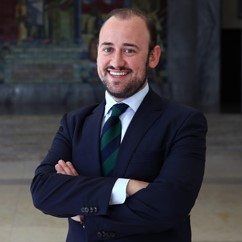

Chief legal officer | BIG - Banco de Investimento Global



Miguel da Câmara Machado
Chief legal officer | BIG - Banco de Investimento Global
Team size: Five
What are the most significant cases or transactions that your legal team has recently been involved in?
Over the past year, the most significant transaction was the structuring of a partnership with IGCP – the Portuguese Treasury and Public Debt Management Agency (“Agência de Gestão da Tesouraria e da Dívida Pública”) to enable the offer of savings certificates digitally. This made us the first bank in Portugal to offer this type of product, which has been in great demand. The process involved negotiations on several fronts, including banking and financial law, data protection, prevention of money laundering, and terrorist financing, among others.
Our activities also included drafting and reviewing policies on conflicts of interest, anti-bribery and anti-corruption, whistleblowing, and cybersecurity. We reviewed and updated the general conditions for opening an account at the Bank, which required extensive multidisciplinary work with different teams within the Bank.
Furthermore, it was also the year of the launch of the Bank’s new mobile phone app, which also required drafting special conditions of use and extensive legal analysis of each aspect. It was very rewarding to take part in the launch of the most modern app on the Portuguese market and ensure its compliance with Portuguese law.
What would you say are the unique qualities required to be successful as an in-house lawyer in your industry?
It seems to me that to be a successful in-house lawyer, we must instil confidence in our interlocutors and be thoughtful, ensuring that we think before we speak. On the other hand, contrary to our contemporary legal instincts, we should try to be as synthetic, systematic, and scientific as possible – like the fathers of modern codification in the 19th century.
Our colleagues and peers want quick, concise, and to-the-point answers. Therefore, it is important to encourage our in-house legal teams to possess strong analytical and research skills, enabling them to arrive at the necessary solutions quickly. It is also very important to be able to communicate with lawyers and non-lawyers and to be able to explain concepts, solutions, and proposals to the recipients.
Furthermore, it is essential to have a commercial sense and not lose awareness of the bank’s business and the fact that we belong to a support area, ensuring that clients and various stakeholders are satisfied.
In addition, one needs to be prudent, aware of the risks that exist at any given time, and capable of making informed decisions. It is also necessary to be organised, adept at managing and prioritising the problems, deadlines, and multiple issues we must deal with. Finally, one must be flexible, adaptable, and able to adjust in an increasingly changing sector.
Do you have a cause, business-related or otherwise, that you are passionate about?
Since 2010, I have been a lecturer at the Faculty of Law of the University of Lisbon, teaching various subjects and disciplines. However, in my sector, since 2014, I have dedicated myself more to researching, writing, and providing training and postgraduate courses on the prevention of money laundering and terrorist financing, alongside other subjects such as banking and corporate compliance, including the ‘ESG’ challenges, and the new cybersecurity issues.
In the previous year, I also published on the role of the Bank of Portugal as a defender of bank customers – particularly focusing on behavioural supervision – and on the civil process of rendering accounts, presenting positions that have been accepted by the case law of the Portuguese courts. Additionally, I have been researching issues related to the weight of the higher courts in legal systems, comparing the Civil and Common Law families. Furthermore, I have a book on US law that is set to launch by the summer of 2024.